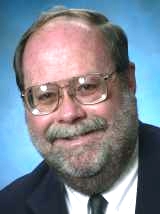Commentary by Dr. Joseph Tainter
Dr. Tainter, Director of the Cultural Heritage Research Project, Rocky Mountain Research Station, Albuquerque, New Mexico, and author of several books about archaeological approaches to sustainability, offers three examples of distinctly different approaches to sustainability challenges faced by different civilizations over the past 2000 years.
Recorded 20 December 2001
How long can we continue the current mode of worldwide resource exploitation and ecological disruption without undermining the natural systems on which we depend? We believe that examination of the human past can yield clues to guide humanity toward a sustainable future.
As a contribution to the global discussion of this critical problem, we have invited a series of archaeologists researching the matter to submit Audio Commentaries about the lessons that archaeology may offer today's world. In this way, we hope to promote a dialogue that will encourage further archaeological research with applications to this and other modern problems.
Our third Audio Commentary on sustainability is by Dr. Joseph A. Tainter (Rocky Mountain Research Station, USDA Forest Service), who has specialized in the study of complex societies with an emphasis on sustainability issues. We offer our sincere thanks to Dr. Tainter for sharing his thoughts.
About Dr. Tainter

Joseph Tainter studied anthropology at the University of California and Northwestern University, where he received the Ph.D. in 1975. He has taught anthropology at the University of New Mexico and currently directs the Cultural Heritage Research Project, Rocky Mountain Research Station, Albuquerque, New Mexico. Research on the evolution of sociocultural complexity has led to fieldwork in California, the Southwest, the Midwest, Hawaii, the Near East, and West Africa, and to the publication of his book The Collapse of Complex Societies (1988). He is co-editor of the books Evolving Complexity and Environmental Risk in the Prehistoric Southwest (1996) and The Way The Wind Blows: Climate, History, and Human Action (2000). Dr. Tainter's interest in sustainability led to collaboration with two ecologists to write Supply-Side Sustainability (forthcoming late 2002), the first book on this topic to combine social, historical, and biological science. His work has been used in the United Nations Environment Programme (Kenya), UNESCO, the European Joint Commission and the National Nutrition Institute (Italy), the International Institute for Applied Systems Analysis (Austria), the Beijer Institute (Sweden), the Center for International Forestry Research (Indonesia), as well as throughout the United States and Canada. He has been invited to present his research to the Getty Research Center, the International Society for Ecological Economics, and many conferences. Dr. Tainter's biography is included in Who's Who in Science and Engineering, Who's Who in America, and Who's Who in the World.
Web Links:
Romans:
The Ancient World Web
Welcome to the Classics(University of Michigan)
Roman Sites (University of Kansas)
Byzantines:
Byzantine & Medieval Studies Sites (Fordham University)
Byzantium 1200 (aimed at presenting computer reconstructions of Byzantine monuments located in Istanbul, Turkey, as of the year 1200)
Byzantium: Byzantine Studies on the Internet (Fordham University)
European warfare:
The Geometry of War, 1500-1750 (University of Oxford)
HUNGARY’S HISTORY 895-1945 (Corvinus Library: Hungarian History)
Polish Renaissance Warfare, 1450-1699 (S. A. Jasinski)
